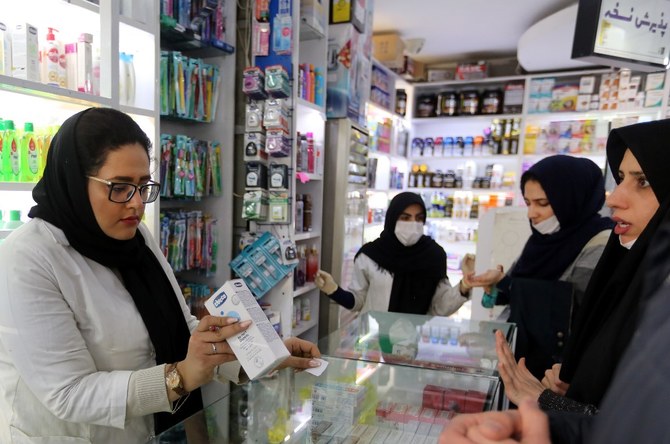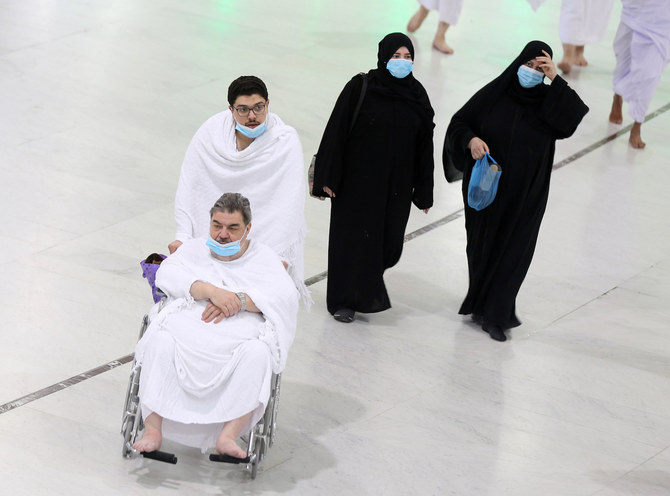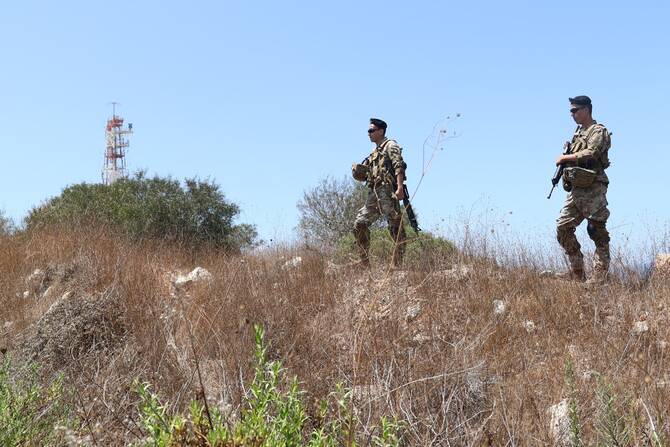DUBAI: Countries in the Middle East are taking extraordinary steps to protect their citizens and residents from the growing coronavirus outbreak, with most infections originating from Iran which is a pilgrimage destination for Shiite Muslims.
19:40 - Oman's health ministry announced a new case of coronavirus bringing the number of people infected to six.
19:35 - State-owned Kuwait Oil Company said on Thursday that it has suspended all domestic and foreign official missions and training programmes for its employees until further notice, as coronavirus spreads in the Middle East.
Kuwait now has 43 confirmed cases of coronavirus, a health ministry official said.
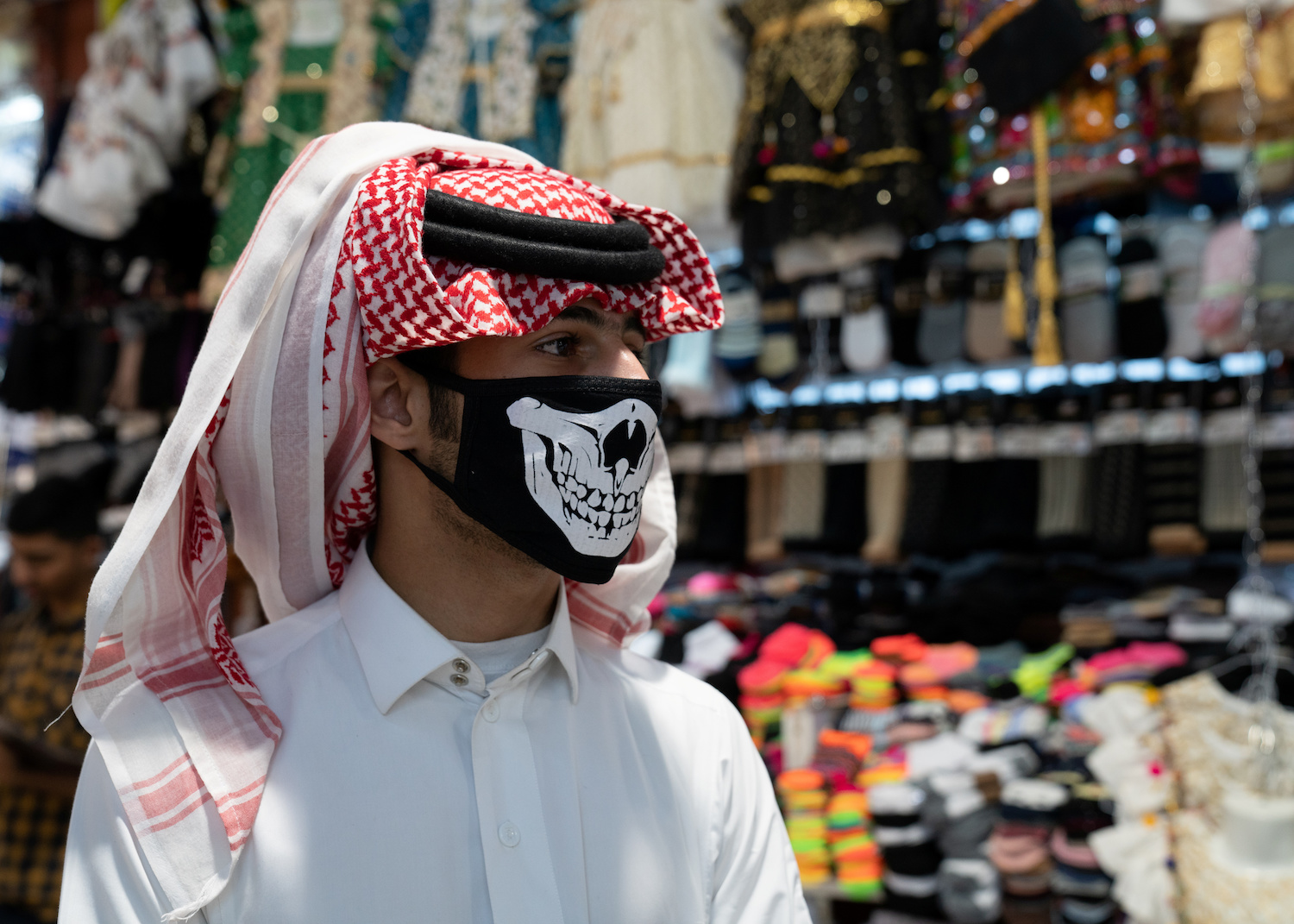
A man wears protective face mask, following the outbreak of the new coronavirus, in Kuwait, February 25, 2020. Picture taken February 25, 2020. (Reuters)
19:16 - France now has 38 confirmed cases of coronavirus and is ready for an epidemic with 138 medical facilities prepared, the country's health minister said.
18:00 - Kuwait's army has suspend studies at military colleges and schools for two weeks starting from Mar.1 over coronavirus concerns.

A man wears protective masks in Kuwait City on February 27, 2020 amidst a world epidemic of cononavirus COVID-19. (AFP)
17:45 - Three further deaths have been reported in northern Italy bringing the death toll to 17.

Tourists, wearing face masks, pose for a selfie in front of a Versace shop window in downtown Milan, Italy, Thursday, Feb. 27, 2020. (AP)
17:15 - The United Arab Emirates has suspended passenger ferry services with Iran until further notice over coronavirus fears, Emirates News Agency (WAM) said.
The UAE has also obliged all commercial ships coming to the country to provide a statement on the health status of their crews 72 hours before arrival to help prevent the spread of the virus.
17:04 - The UAE's health ministry said six more people have been infected with coronavirus in the country and that four of them are Chinese nationals.
16:00 - The UAE's health ministry announced the recovery of two Chinese nationals who had been infected with coronavrius.
15:00 - UAE nationals and citizens of Gulf Cooperation Council (GCC) nations will not be able to use a national identity card to travel to and from the Emirates for the time being, the country announced.
14:15 - “Coronavirus came unseen and undetected into Iran and the extent of the infection may be broader than we think,” said the executive director of the World Health Organization’s (WHO) Health Emergencies Programme Dr Michael Ryan.
14:00 - Kuwait called on its citizens to avoid traveling abroad unless absolutely necessary as coronavirus fears mount.
13:15 - Saudi Arabia’s Ministry of Hajj and Umrah said that it continues to supervise the provision of services to Umrah pilgrims in the Kingdom to ensure that they complete their rituals with ease and leave for their countries safely.
Earlier on Thursday, the Kingdom suspended arrivals by foreigners for the Umrah pilgrimage and tourists from two dozen countries where the new coronavirus has spread, as a growing number of cases globally deepened fears of a pandemic.
The Saudi Foreign Ministry said the suspensions were temporary but provided no timeframe. Entry is also suspended for visits to the Prophet's Mosque in Madinah.
"Protecting the pilgrims ... and the sacred sites from the arrival of this disease is very important," Health Ministry spokesman Mohammed Abdelali said after government officials met to discuss preventative measures.
"Saudi Arabia feels a sense of responsibility, therefore we took these temporary decisions which will constantly be reviewed."
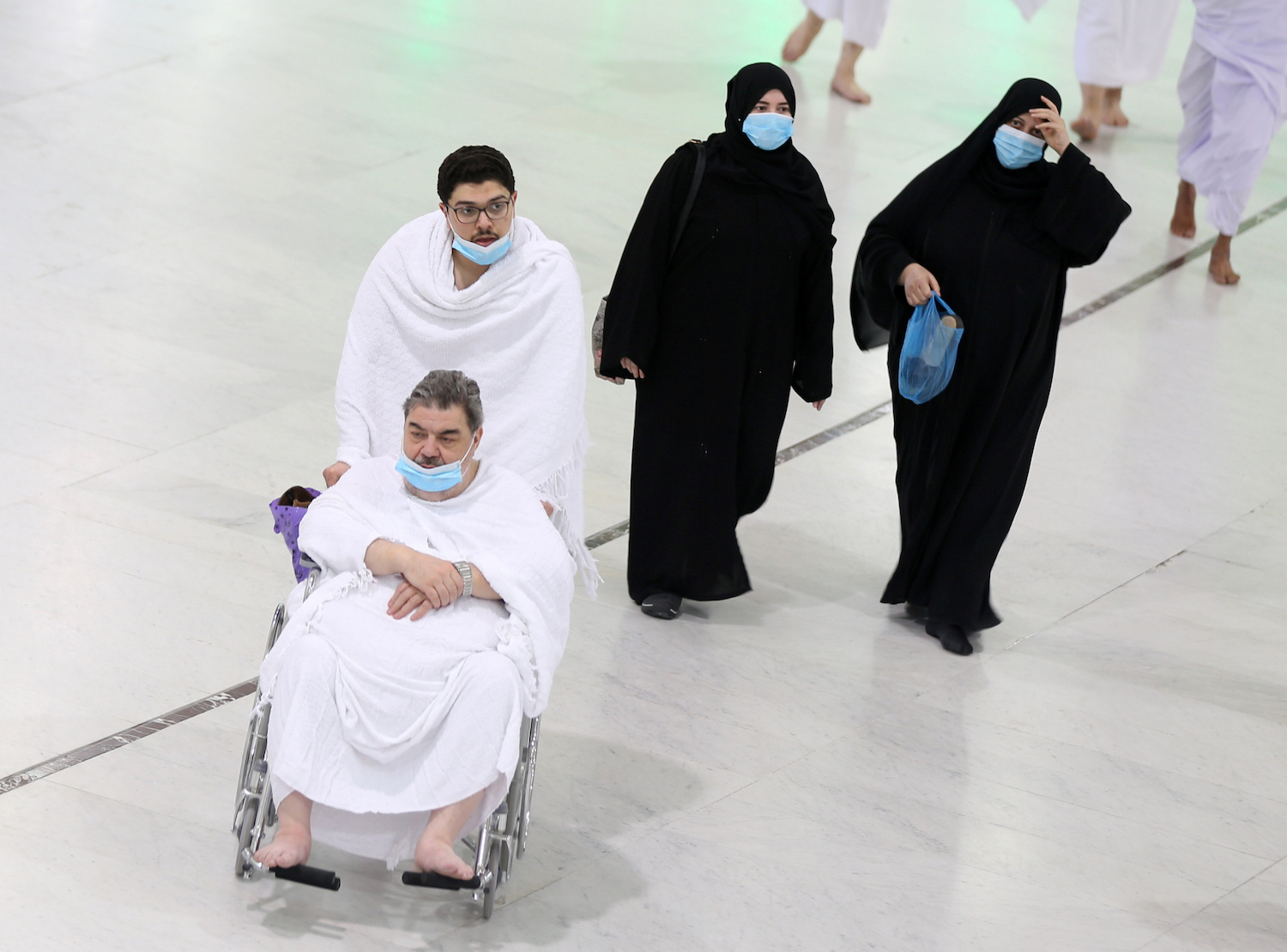
Muslim pilgrims wear protective face masks at the Grand mosque in the holy city of Makkah, Saudi Arabia on Feb. 27, 2020. (Reuters)
13:03 – Iran has banned Chinese citizens from entering the country, IRNA state news agency reported.
11:42 – Indonesia’s foreign minister on Thursday urged Saudi Arabia to allow its citizens to continue their Umrah pilgrimage after hundreds were stranded at Jakarta airport when the Kingdom suspended foreign entry for the Umrah over coronavirus concerns.
Indonesia is the world’s biggest Muslim-majority country and it often sends around 1 million people on the Umrah pilgrimage every year in the kingdom, which hosts the two holiest sites of Islam in Makkah and Medina.
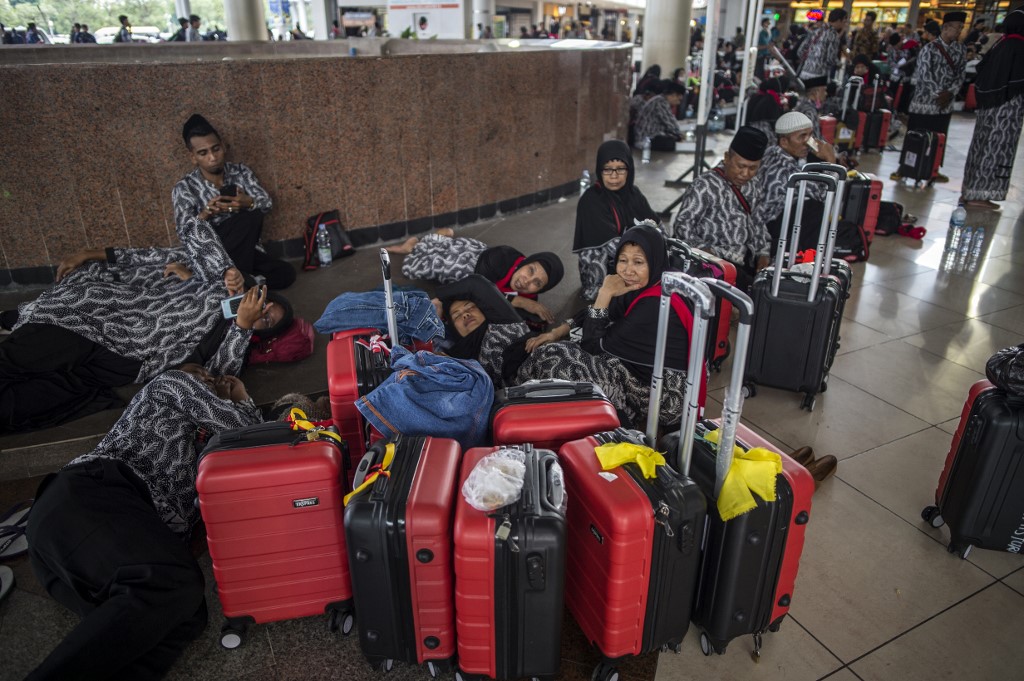
Umrah pilgrims pile up at Juanda International Airport in Sidoarjo, East Java province on February 27, 2020 after Saudi Arabia suspended visas for visits to Islam’s holiest sites. (AFP)
10:59 – A Saudi health ministry spokesman said there had been no confirmed cases of coronavirus in the Kingdom.
10:31 –The death toll in Iran from coronavirus reached 26, with 245 confirmed cases as of Thursday, state TV Al-Alam reported. There has been 106 confirmed cases in the last 24 hours, the report added. Iran’s health ministry meanwhile said that cultural events, conferences, cinemas closure was extended for one more week, as authorities called on people to avoid unnecessary trips inside the country.
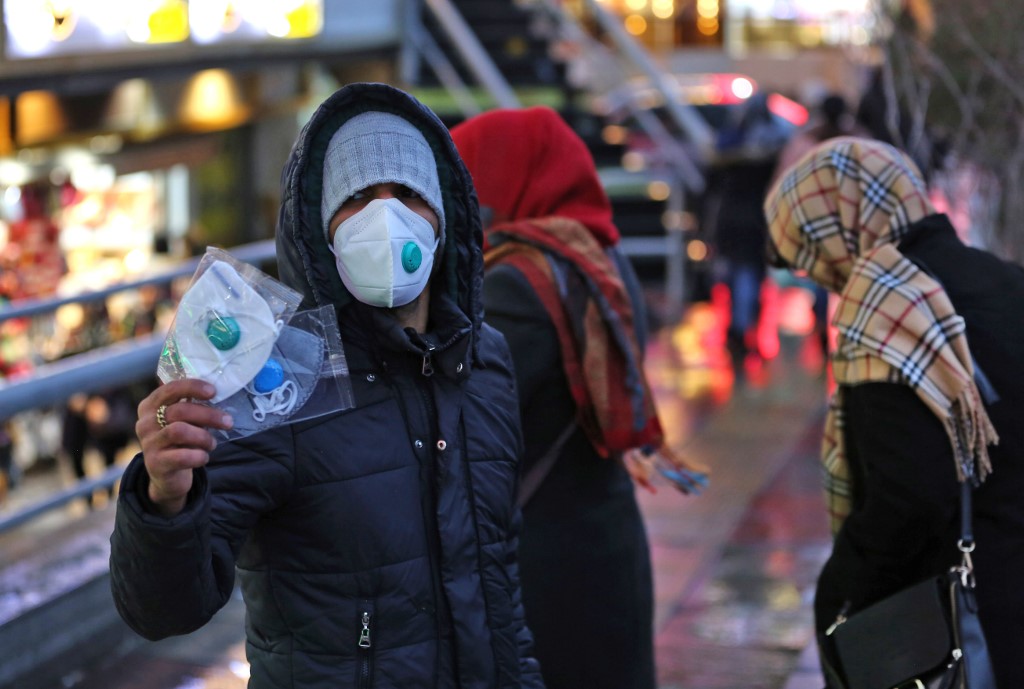
Above, a street vendor sells protective masks in Tehran. The government called on people to avoid unnecessary trips inside the country. (AFP)
10:02 – Dubai airline Emirates said it would no longer carry to Saudi Arabia passengers with Umrah pilgrimage visas or tourists from nearly two dozen countries until further notice, in compliance with a Saudi government directive to contain the coronavirus outbreak. The ban takes effect on Thursday.
Holders of Saudi tourist visas traveling from China, Japan, Italy, Iran, India, Pakistan and a number of other countries will be barred from boarding Emirates flights with Saudi Arabia as the final destination, the airline said on its website.

Emirates said it would no longer carry to Saudi Arabia passengers with Umrah pilgrimage visas or tourists from nearly two dozen countries until further notice. (AFP)
09:46 – The head of the Iranian National Security Committee announced that he was infected with coronavirus.
08:45 – Kuwait’s Ministry of Interior has temporarily suspended the use of GCC national identity cards for travel to and from the country.
06:27 – Twenty two people have died so far from the new coronavirus in Iran, the official Iranian news agency IRNA reported in a chart it published on Thursday. The number of people diagnosed with the disease is 141, the chart showed. It did not specify whether those who have died were included in the tally of those infected. Iranian officials on Wednesday reported a total of 139 cases of coronavirus and 19 deaths.
06:20 – The Kuwait health ministry reported 43 confirmed coronavirus cases, and all of the patients have traveled from Iran. Health officials also said that infectious disease specialist teams have been formed to deal with coronavirus patients, who have been been isolated and in the process of recovery. “We are monitoring all those who have been in contact with coronavirus patients,” the officials added, and hotlines have been set up to receive reports of possible coronavirus case.
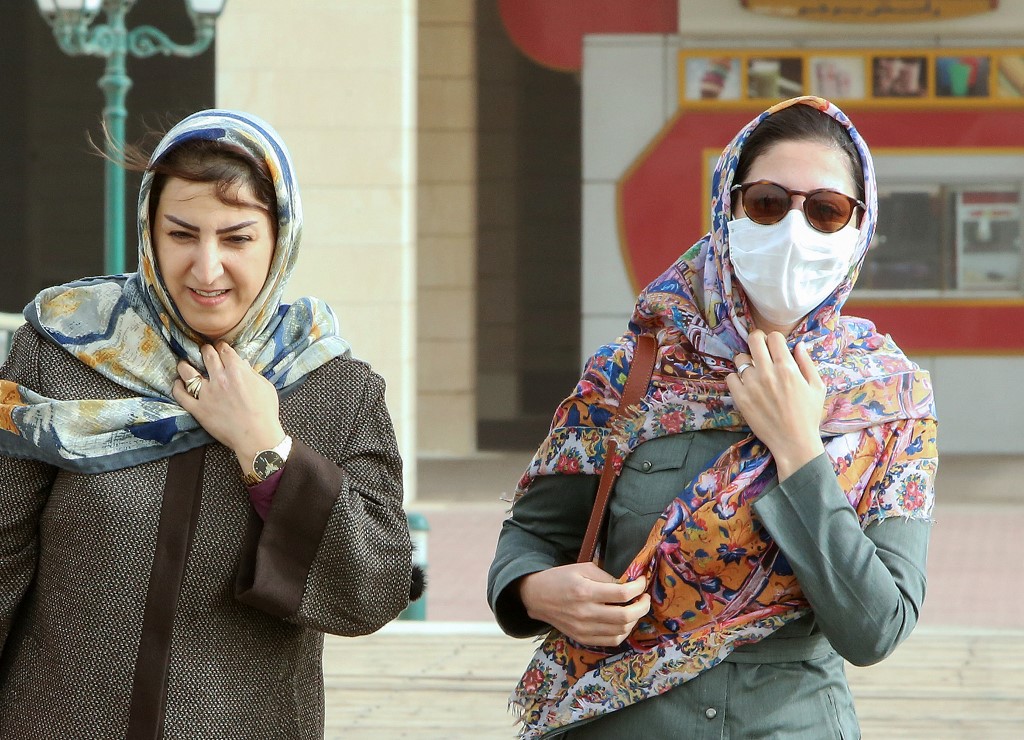
The Kuwait health ministry reported 43 confirmed coronavirus cases on Thursday. (AFP)
04:57 – Iraq has confirmed its sixth case of coronavirus, in a young Iraqi man in Baghdad who had traveled from Iran, the health ministry said.
04:24 – In Oman, budget airline SalamAir said it will operate a special flight from Muscat to Shiraz. “SalamAir announces the operation of a special flight, Muscat-Shiraz-Muscat, on Thursday, 27th February 2020, to return the stranded citizens and residents.”
تنويه بشأن رحلات إيران
Announcement | Iran Flights #طيران_السلام #SalamAir pic.twitter.com/5iOzThWruO— SalamAir (@SalamAir) February 26, 2020
Thursday, Feb. 27, 2020
21:20 – Bahrain’s Civil Aviation Affairs in the Kingdom of Bahrain issued a statement announcing the suspension all flights to and from the Iraq and Lebanon until further notice. It separately extended a 48-hour ban over flights from Dubai and Sharjah in the United Arab Emirates.
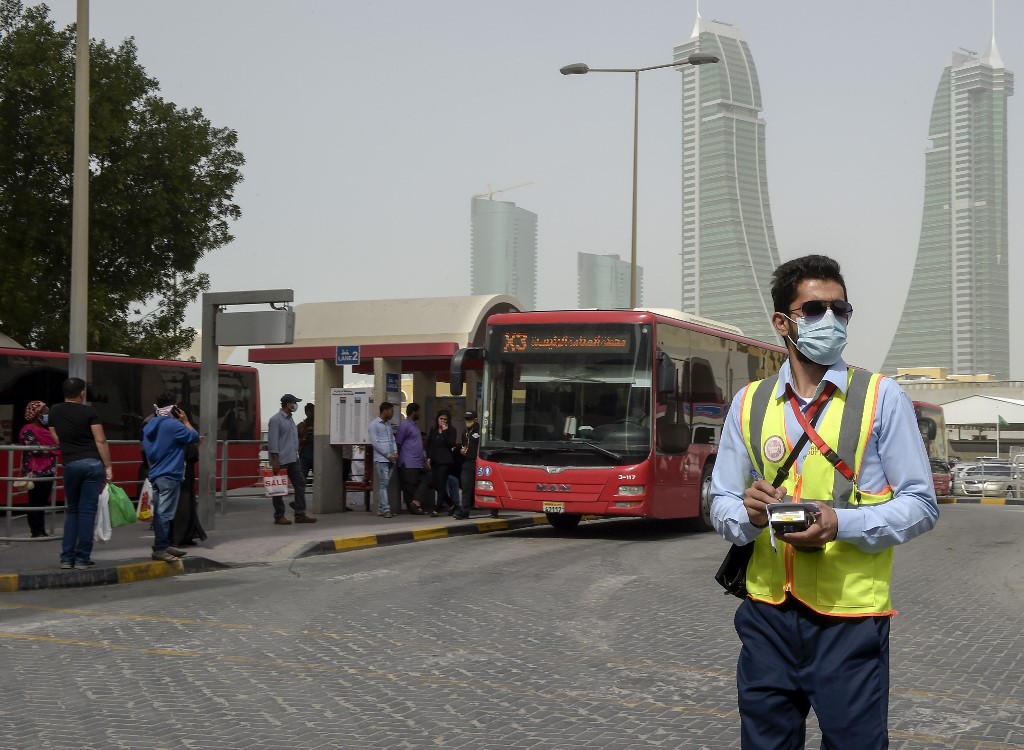
A bus conductor wearing a surgical mask stands in front of a bus station in the Bahraini capital Manama on February 26, 2020. (AFP)
19:59 – Kuwait Airways said it will operate a special flight on Thursday to evacuate nationals from Italy’s Milan after confirming deaths of some cases infected with the new coronavirus there.
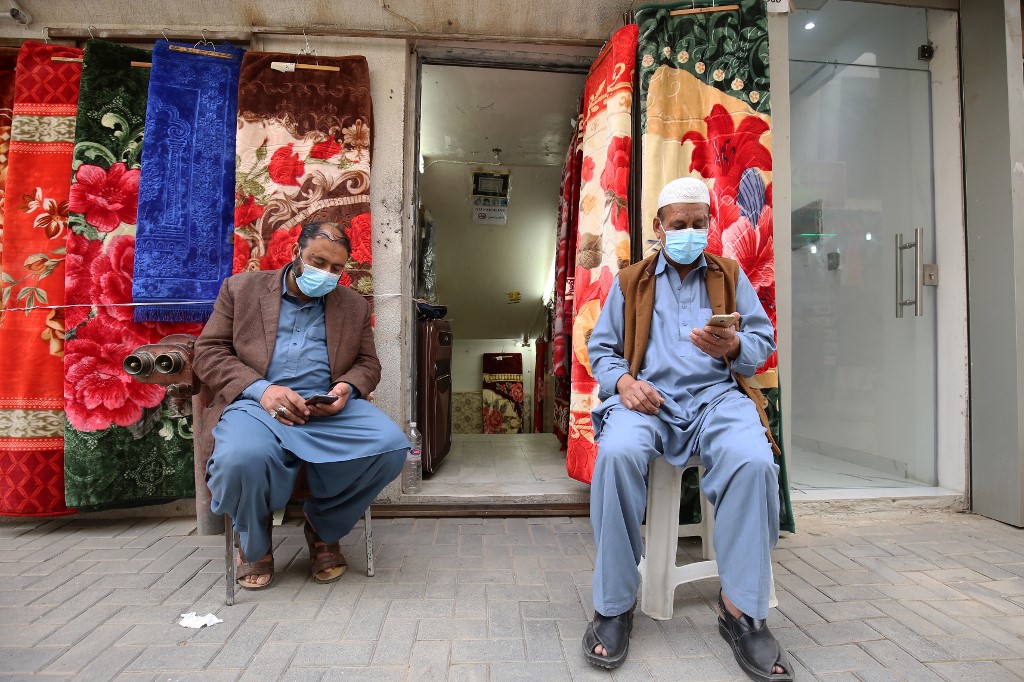
Vendors, wearing protective masks, sit outside their shop in Kuwait City on February 26, 2020. (AFP)
19:08 – The Kuwaiti Cabinet announced the suspension of all government and private schools, colleges, universities and military colleges and Awqaf and Islamic Affairs educational centers from March 1, 2020 until March 12, 2020.
Wednesday, Feb. 26, 2020


